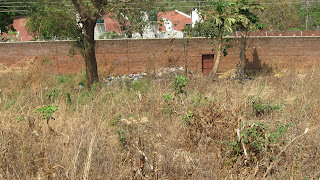Mr. McGuire: I just want to say one word to you. Just one word.
Benjamin: Yes, sir.
Mr. McGuire: Are you listening?
Benjamin: Yes, I am.
Mr. McGuire: Plastics.
Benjamin: Exactly how do you mean?
This is how he means in Malawi:
 |
| Delicious corn field |
In Malawi and many other developing countries (it was identical in Mongolia), just enough wealth exists to create a demand in retail businesses for goods wrapped and made out of plastic. Additionally, rather than using traditional leather or reed containers, shoppers receive everything in a plastic bag. Unfortunately, this change has not coincided with a system or culture for collecting and disposing of this waste. Every day while walking about town you will see locals simply tossing their rubbish onto the ground, likely because that has always been sufficient: until recently, everything was biodegradable. Furthermore, even if someone wants to get rid of their trash "correctly" the options are not available. I have seen only a few bins, all of which have been overflowing. Or, as is commonly popular, folks pitch their trash over the wall into a pile and burn it:
 |
| Burn pile behind housing complex |
No comments:
Post a Comment